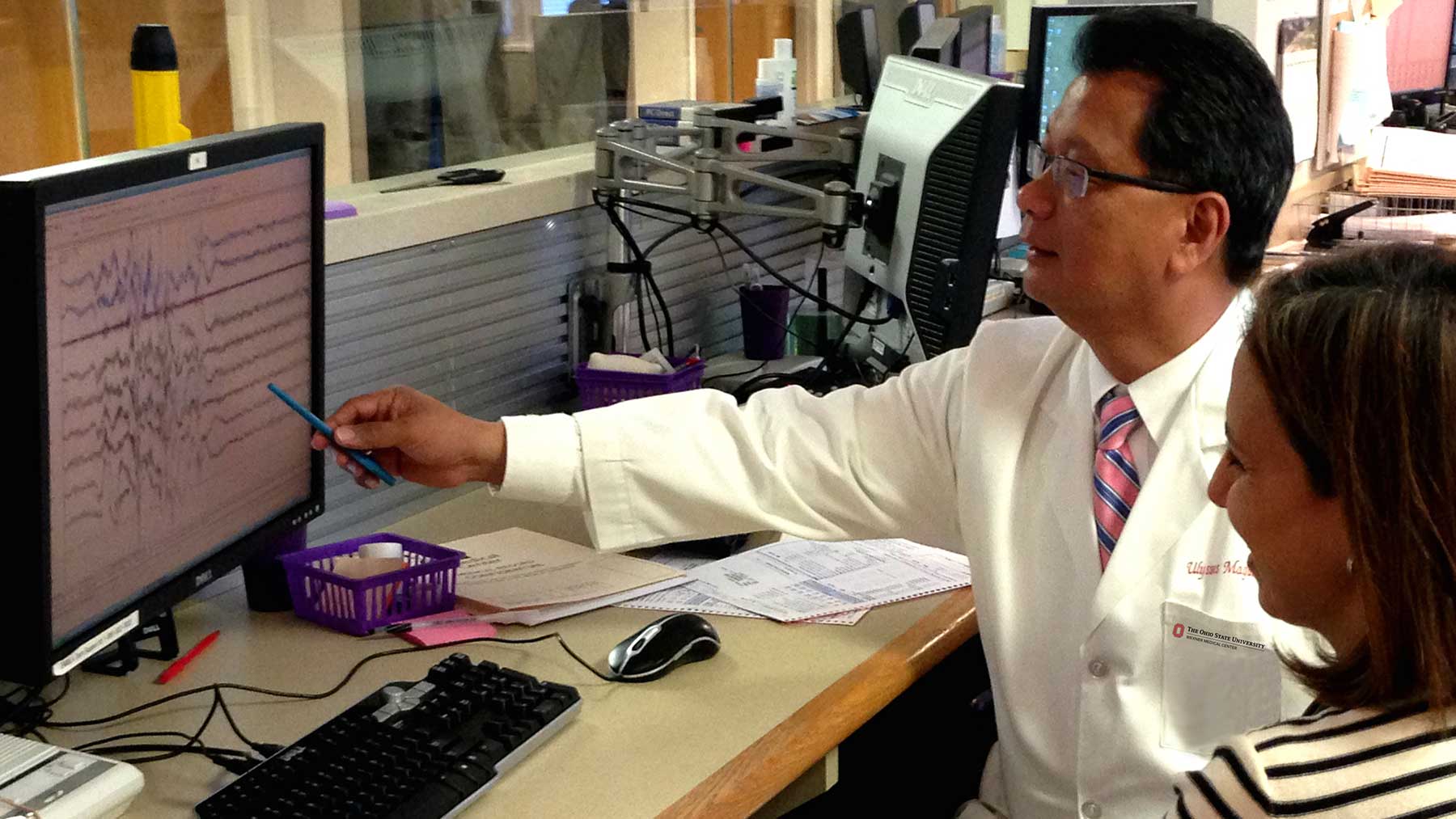How many hours of sleep do you need?

Eight has long been accepted as the magic number of sleep hours to strive for each night, but that figure is far from universal. Perhaps you can get by with seven hours, but how can you tell if your body actually needs more?
It’s an important question since lack of sleep can have major health consequences – both near-term and long-term.
We got the answers to the pressing questions regarding sleep from Ulysses Magalang, MD, director of the Ohio State Sleep Disorders Center, and sleep lab manager Dani Livelsberger.
How many hours of sleep do I need?
Livelsberger says everyone should go through five cycles of three stages of sleep each night: stage 1 is just starting to fall asleep and stage 3 is REM (rapid eye movement), or dreaming.
While it’s important for us all to experience all the stages, especially REM, the amount of sleep time for each person can vary slightly.
Livelsberger says the gold standard is still eight hours. However, there are people who can survive on less, as well as others who may need more.
“You have to be honest with yourself. Do you feel good? A lot of people getting six or seven hours feel better overall when they get eight or nine,” she says.
She says of equal concern to the individual number of hours each night is being inconsistent throughout the week.
“We see people who get very little sleep Monday through Friday and then try to make all of it up on Saturday and Sunday. For the most part, we are creatures of habit and following a routine sleep schedule is better for us,” explains Livelsberger.
How important is sleep to health?
Sleep is essential to overall health and well-being. Livelsberger cites numerous studies that show sleep deprivation can mimic how your body operates when you are slightly intoxicated.
“Lack of sleep definitely reduces our response time and causes us to make bad decisions,” she explains.
Lack of sleep can have damaging long-term health risks as well.
“If you’re tired, you’re going to be less active – so you’re going to gain weight, which is going to make you more tired and so on. So it’s a vicious cycle once it starts. And it only gets worse as we age,” says Livelsberger.
Poor sleep can also develop into long-term sleep disorders.
What are the different types of sleep disorders?
Dr. Magalang says the Ohio State Sleep Lab treats patients who often have one of these four sleep disorders:
- Trouble staying awake during the day (hypersomnia)
- Difficulty sleeping at night (insomnia)
- Unusual behavior during sleep (ex: sleep walking, seizures)
- Problems with circadian rhythm or delayed (by 2+ hours) sleep phase
People experiencing these types of issues may be referred to the Ohio State Sleep Disorders Clinic, where – as it sounds – you will sleep in the lab, while electrodes and wires are connected to your scalp.
“We can measure every element of your sleep: when exactly you go into REM, how much you move around and many other factors that determine the quality of sleep,” explains Dr. Magalang.
How can you get better sleep?
Livelsberger says the quality of sleep you are getting can depend a lot on what you keep in the bedroom.
The light from tech devices – be it TVs, smart phones, even alarm clocks – can be some of your greatest undoing.
“Even with your eyes closed, that light still affects you. And that light is sending your brain a signal to stay awake,” explains Livelsberger.
Dr. Magalang echoes the importance of disconnecting once you reach your bedroom door.
“Think of it as practicing good sleep hygiene. We brush our teeth for oral health. We should turn off our screens for good sleep health.”
Gray Matters Podcast
You can learn more about cutting-edge brain research underway at Ohio State and beyond by downloading the Gray Matters Brain Health podcast.
Are you at risk for stroke?
Are you a smoker?
Do you get enough exercise? For adults, the CDC recommends 2 1/2 hours of moderate activity every week, combined with muscle-strengthening activities on two or more days each week.
Do you have atrial fibrillation? (Atrial fibrillation is a rapid and irregular heart rhythm that originates from the top chambers of the heart called the atria.)
Do you have diabetes?
Has anyone in your family had a stroke?
Are you overweight?
What is your blood pressure?
What's your cholesterol level?
Your answers on this quiz will not be stored or shared.
If you’re concerned about your stroke risk, talk to your primary care physician today about a referral to Ohio State’s Comprehensive Stroke Center. If you need a primary care physician, call 800-293-5123 to find a physician near you.
Risk factor: High
Your risk factors suggest that your risk of a stroke is high. We recommend that you ask your primary care physician for a referral to Ohio State's Comprehensive Stroke Center. If you need a primary care physician, call 800-293-5123 to find a physician near you.
Please note this quiz is for informational purposes only and is not intended to diagnose or treat any disease or illness.
Risk factor: Low
You are considered low-risk for stroke. You're doing very well at controlling your stroke risk.
If you're still concerned about your risk, talk to your primary care physician today about ways to reduce your risk of stroke. If you need a primary care physician, call 800-293-5123 to find a physician near you.
Please note this quiz is for informational purposes only and is not intended to diagnose or treat any disease or illness.
Risk factor: Caution (medium risk)
This is a good start. Continue to work on reducing your stroke risk.
If you're concerned about your risk, talk to your primary care physician today about ways to reduce your risk of stroke. If you need a primary care physician, call 800-293-5123 to find a physician near you.
Please note this quiz is for informational purposes only and is not intended to diagnose or treat any disease or illness.
Thank you!
Four out of five strokes are preventable. Though you cannot change certain risk factors, such as your age or gender, many of the ways to reduce your stroke risk are in your control.
The Ohio State Comprehensive Stroke Center can help you reduce your risk. Call 800-293-5123 to find a physician near you.
Learn more about the Ohio State Comprehensive Stroke Center.




